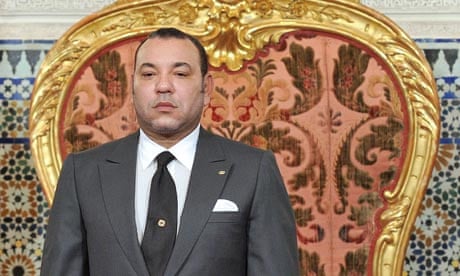Morocco's king, Mohamed VI, has responded to the Arab spring by rewriting his country's constitution and giving greater power to elected politicians but leaving him with a firm grip on security, the army and religious matters.
The draft constitution, which will be put to referendum on 1 July, sees some power being shifted away from the Arab world's longest-serving dynasty and from the tight clique of palace officials who dominate Morocco.
Among other measures, the new constitution explicitly states that the king will now have to pick the country's prime minister from the party that wins elections to what, up until now, has been a largely rubber-stamp parliament.
While the government gains executive powers, the 47-year-old monarch has kept exclusive control over the military and over religion.
And analysts pointed out that while the prime minister would be in charge of domestic policy, he does so with the king's permission and with the monarch still able to pass his own decrees.
"He is sharing some executive powers with the PM [but] still retains significant ones," said the respected, if anonymous, Maghreb Blog on its Twitter feed. "The changes do nothing to his real discretionary, religious and military powers."
Mohamed VI presented the measuresto the country in a TV broadcast.
The king said the constitutional reform "confirms the features and mechanisms of the parliamentary nature of the Moroccan political system" and laid the basis for an "efficient, rational constitutional system whose core elements are the balance, independence and separation of powers, and whose foremost goal is the freedom and dignity of citizens.
After facing the biggest protests in decades, the king ordered a committee in March to draw up the new constitution after discussions with political parties, trade unions and NGOs.
Moroccans first took to the streets in February, but the country has not experienced the degree of violence seen elsewhere in Arab countries.
Officials claimed that respect for the king combined with a regime that is more liberal and less severely policed than elsewhere had helped prevent a Tunisian or Egyptian-style uprising.
But Moroccans are clearly fed up with rampant corruption which, according to US embassy cables released by WikiLeaks, stretches right into the heart of Mohamed VI's palace. Those cables show one former US ambassador to Rabat condemning "the appalling greed of those close to King Mohammed VI".
"Major institutions and processes of the Moroccan state are used by the palace to coerce and solicit bribes in the real estate sector," one senior Moroccan businessman complained to US diplomats
Corruption is also rampant in courts, business and health services, according to Transparency Maroc.
Many Moroccans would like to see their country enjoy the sort of economic growth that countries such as Tunisia or Turkey have had over the past two decades.
The king said a constitutional court would also be set up while "the draft constitution criminalises any interference, corruption or influence peddling with regard to the judiciary".
He said the constitution "criminalizes torture, enforced disappearance, arbitrary detention and all forms of discrimination and inhuman, degrading practices" while also upholding "freedom of the press and of expression and opinion." within unspecified legally enforcable boundaries.
The reforms will be closely monitored by Gulf Arab monarchies, which have so far dodged calls at home for reforms and fret that major change in Morocco might fuel further demands from reformists in their countries.
In Muslim Morocco the monarch is formally considered the nation's religious leader with the title of commander of the faithful.
But the new constitution will see his status changed slightly, with the term "sacred" disappearing but the monarch still remaining "inviolable", the king said.
The referendum date gives Moroccans – 44 % of whom are illiterate – just two weeks to find out about and debate the new constitution's contents.
Few commentators doubted, however, that it would be passed even though pro-democracy activists from the February 20 movement dismissed many of the changes as cosmetic.
After the speech ended, cars flying Moroccan flags drove through the streets of the capital Rabat honking their horns, with passengers cheering into the night and young people marched along the wide boulevards banging drums and cheering.
Najib Chawki, a February 20 activist, said the constitutional reform draft "does not respond to the essence of our demands which is establishing a parliamentary monarchy. We are basically moving from a de facto absolute monarchy to a constitutional monarchy".
Activists claimed that the reform programme initially introduced by King Mohamed, who brought in greater freedoms and improved women's rights when he inherited the throne 12 years ago, had effectively ground to a halt.
Activists on Twitter said that pro-government mobs had attacked at least one pro-democracy activist
